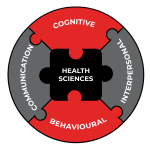5.8 Program: Paramedic
Video: Ontario Paramedics Facing #COVID on the Frontlines
Video: “Ontario Paramedics Facing #COVID on the Frontlines” by Ontario Paramedic Assoiciation [2:08] No Speaking.
About the Profession
The role of a paramedic is one of the most rewarding and challenging careers around. When lives are at stake, you’re the one who takes charge. If you’re excited about being on the front line of medical care, Fanshawe’s two-year Paramedic Ontario College Diploma program will give you the specialized skills necessary to begin an adventurous and highly valued career. (Fanshawe College, n.d.-e).
Places you might find yourself employed include
Paramedic service, emergency medical transport, patient transfer, hospitals, community events.
Workers in paramedical occupations administer pre-hospital emergency medical care to patients with injuries or medical illnesses and transport them to hospitals or other medical facilities for further medical care. They are employed by private ambulance services, hospitals, fire departments, government departments and agencies, manufacturing firms, mining companies and other private sector establishments. Paramedics who are supervisors are included in this unit group.
Job Duties
- Assess extent of injuries or medical illnesses of trauma victims, patients with respiratory disease and stress, overdose and poisoning victims, industrial accident victims and other ill or injured individuals to determine emergency medical treatment
- Administer pre-hospital emergency care to patients such as oxygen therapy, cardiopulmonary resuscitation (CPR), spinal immobilization, bandaging and splinting
- Establish and maintain intravenous treatment (IV), apply adjunctive equipment for ventilation and circulation complications, administer medications and provide other advanced emergency treatment to patients
- Transport patients by air, land or water to hospital or other medical facility for further medical care
- Collaborate with ambulance dispatch centres, hospital staff, police, firefighters and family members to ensure relevant information is collected and proper treatment is administered
- Document and record nature of injuries and illnesses and treatment provided
- Assist hospital personnel with provision of medical treatment, if necessary
- Maintain emergency care equipment and supplies
- May train and supervise other workers in this unit group
- May assist with triage of emergency patients.
(Government of Canada. Paramedic in Canada. Reproduced under terms of use.)
Professional Associations

Ontario Association of Paramedic Chiefs
Ottawa Paramedic Physical Abilities Test
Program Fit
What personal qualities should someone interested in this career have?
- Work well under pressure
- Strong leadership abilities; able to provide clear directions to people
- Sound decision making skills
- A strong desire to help those in need, sick people of all ages
- Ability to empathize with others
- Ability to work on a team
- Self-motivation and work independently
- The ability to remain firm, reassuring and efficient in moments of crisis
- Willing to handle situations involving blood, body fluids and matter and extreme personal situations
- Ability to comply with industry (professional) standards & expectations
Useful background experience for this program would be
St. John’s ambulance volunteer, Leadership experience (school council, youth group or church leader, camp counsellor), or experience as a lifeguard.
Typical working conditions for this kind of work:
- This work is physically demanding. Emergency medical personnel are required to lift loads in excess of 95kg (210lbs) with assistance.
- Observe safety precautions to avoid injury when working with equipment and exposure to potentially hazardous biological agents.
- Work both indoors and outdoors, often in stressful circumstances.
- Work shifts that including evenings, weekends and holidays; may work 8, 10, 12, 14 or 24 hour shifts.
- Diverse/uncontrolled working conditions, including periods of inactivity
- Deal with blood/vomit/body material/body parts
- Placed in situations that most never see, involved with extremes of human behaviour
Tasks a graduate may do in the workplace
See full list at Ontarioparamedic.ca
- Conduct patient assessments
- Provide basic airway management
- Administer oxygen by demand, by bag-valve-mask or basic mechanical ventilation
- Perform cardio pulmonary resuscitation (CPR)
- Provide basic trauma care (e.g. spinal and wound care, limb immobilization/traction)
- Administer symptom relief medications and perform semi-automated external defibrillation (SAED)
Becoming a Paramedic
The Paramedic program at Fanshawe College is a 4 term, 60 week Ontario College Diploma program starting in September each year. The program workload is considered to be heavy with:
- Nine courses in your first semester
- 2 – 3 hours of study required for each hour in class
- 22 hours of class (44-66 hour/week commitment)
The courses you would take at Fanshawe College can be found on the Paramedic page.
Fitness qualifications are required for graduation and employment. As a result students are encourage to begin their fitness training as soon as possible. An example of the requirements can be found: Ottawa Paramedic Physical Abilities Test
Fanshawe’s Paramedic program is nationally accredited by the Canadian Medical Association and is currently the only one of its kind in Ontario to be recognized by the Canadian Armed Forces.
Graduates of this program are eligible to write Ontario’s Advanced Emergency Medical Care Assistant (AEMCA) certification exam. Upon successful completion of this exam, graduates will be qualified for base hospital certification and employment as a paramedic in the province of Ontario.
Fanshawe Pathfinder: Paramedic © Fanshawe College used with permission, All Rights Reserved
Admission Requirements:
Paramedic Admission Requirements
Post Admission Requirements you should consider.
Related Careers and Pathways
Pathways to Advanced Diplomas and Degrees
PHS Graduates:
Are given additional consideration when applying to 3 year advanced diploma certificate program
Sarah Marrone
PCP Middlesex-London EMS
| Current employer |
Middlesex-London EMS – Primary Care Paramedic |
| Skills you use professionally | Some of the skills used daily as a primary care paramedic are multi-tasking, problem solving, conflict resolution, ability to work under pressure, and ability to work well with others. |
| Favourite memory/experience | One of my favourite experiences is when we get to meet cardiac arrest survivors at Survivor Day that we were able to resuscitate and give another chance at life. |
| Credentials/Past professional experiences |
Pre-Health Program – Fanshawe College
Emergency Telecommunications – Fanshawe College First Aid/CPR – Health Care Provider Level Primary Care Paramedic Program – Fanshawe College |
| One thing you would tell your student self |
Never limit yourself to only one option/opportunity – you never know what career might be out there that you didn’t know about or that you would love |


